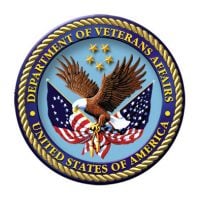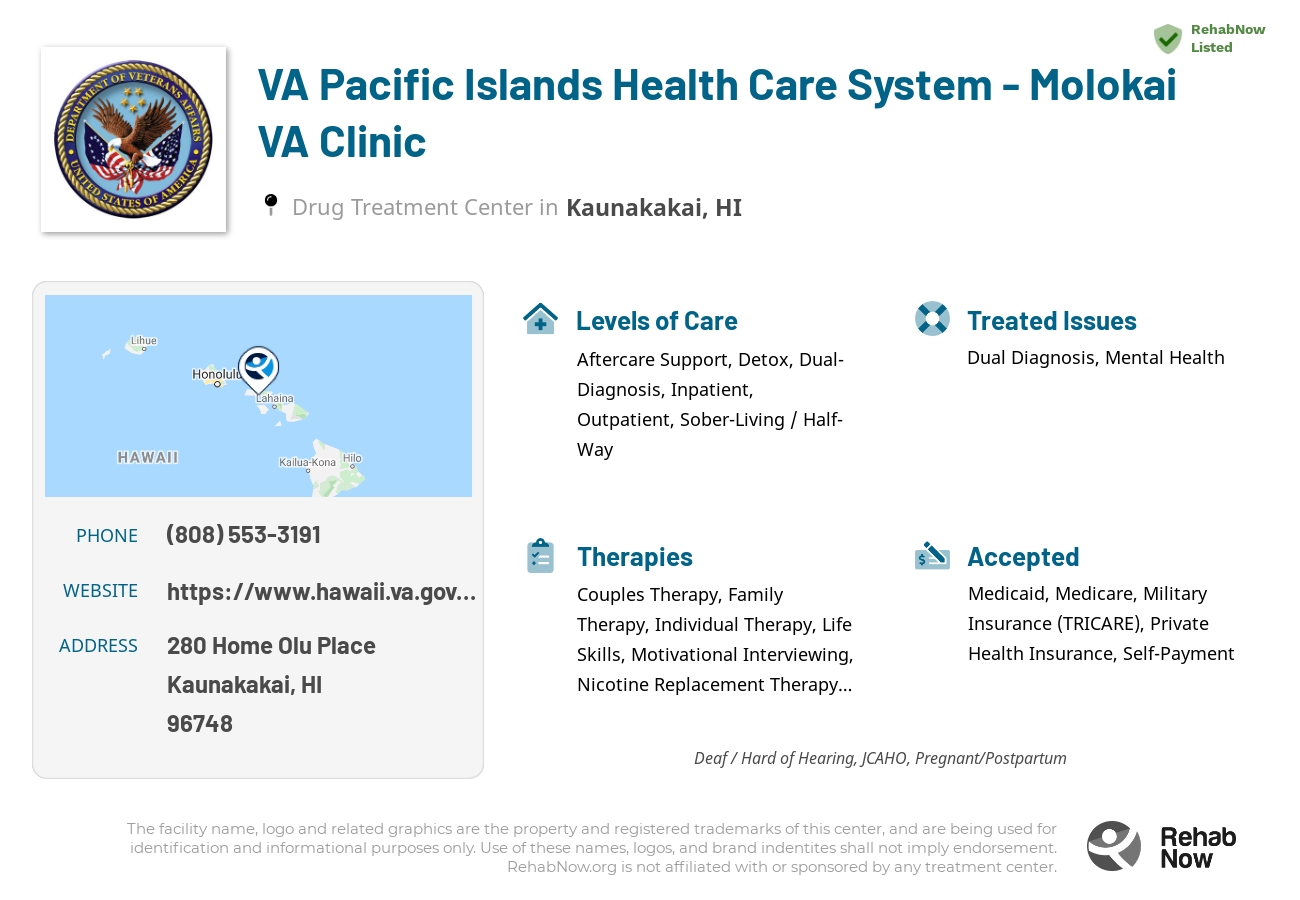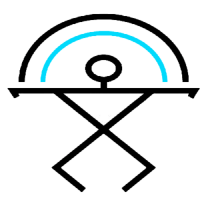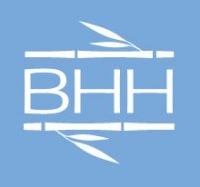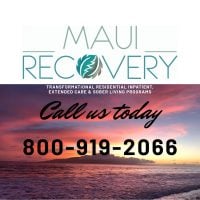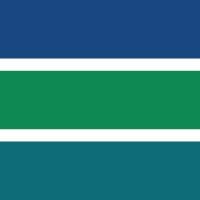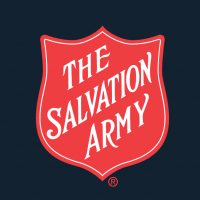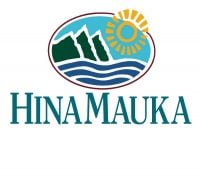About VA Pacific Islands Health Care System - Molokai VA Clinic in Hawaii
VA Pacific Islands Health Care System - Molokai VA Clinic is a licensed and accredited Dual Diagnosis (Co-Occuring Disorders), Mental Health and Drug Treatment Facility in Kaunakakai, HI that offers a variety of methods methods and programs for Dual Diagnosis (Co-Occuring Disorders), Mental Health, and Drug Addiction. and other related Drug Addiction issues. Addiction is a disease that can be treated. There are many different types of treatment available here to help addicts get sober, including inpatient and outpatient programs. The first step towards recovery is admitting there’s a problem, so if you or someone you love has an addiction, don’t wait any longer to seek help.
This facility can help you quit drugs and live a sober life. This facility offers evidence-based treatment methods for drug addicts who want to change their lives for good. Patients are surrounded by compassionate staff members who understand what you are going through and will support your journey towards sobriety every step of the way. This facility does not decline any gender. All genders are welcomed at VA Pacific Islands Health Care System - Molokai VA Clinic, they've also declared themselves an LGBTQ+ ally.
When selecting a treatment facility, accreditations are clearly important. JCAHO has Accredited this facility. Medicaid, Medicare, Military Insurance (TRICARE), Private Health Insurance, Self-Payment, Sliding Scale are some of the ways clients can pay for treatment here. Fortunately VA Pacific Islands Health Care System - Molokai VA Clinic accepts private insurance. For additional information regarding paying for treatment, continue reading.
Genders
Ages
Modality
Additional
Accreditations

JCAHO
Conditions and Issues Treated
A “dual diagnosis” is when the individual has two medical issues at the same time. The top co-occurring mental disorders with addiction are depression, anxiety, ADHD, bi-polar disorder. Addiction is also considered a mental illness that is not a choice but rather a medical condition. Addiction can be caused by any number of underlying issues.
Dual diagnosis is provided by VA Pacific Islands Health Care System - Molokai VA Clinic to treat addictive tendencies as well as any untreated mental illnesses. This ensures successful long term health and recovery for patients after treatment has been completed.
Dual diagnosis is provided by VA Pacific Islands Health Care System - Molokai VA Clinic to treat addictive tendencies as well as any untreated mental illnesses for people in Hawaii. This ensures successful long term health and recovery for patients after treatment has been completed.Levels of Care Offered
This center offers a variety of custom treatment tailored to individual recovery. Currently available are Aftercare Support, Detox, Dual-Diagnosis, Inpatient, Outpatient, Residential, Sober-Living / Half-Way, with additional therapies available as listed below.
The first level of recovery is detox. It involves giving a person the opportunity to get the toxins out of their body safely. The individual receiving treatment at VA Pacific Islands Health Care System - Molokai VA Clinic typically will get ill during detox, and they will often start using again to get rid of unpleasant emotions and complicated physical responses. It is why having a Hawaii medical professional present is so critical. A medical professional can make sure that patients do not start using again during detox and stay physically healthy during the process. They will also have treatment on a mental level to relieve their symptoms and guide them through the process.
Going to an inpatient rehab facility means living there while all aspects of addiction or co-occurring disorder get addressed. The treatment involves medical supervision, therapy, and future planning.
This type of rehabilitation provides a drug-free environment for people who struggle with chronic/long-term addiction without having access to drugs outside the center (or their own home). It takes away any distractions because they live there 24 hours per day. If someone is trying to break out old habits, which could lead them back into substance abuse, things like jobs or school can be put on hold until after they complete their stay to focus solely on recovery.
Outpatient programs at VA Pacific Islands Health Care System - Molokai VA Clinic, the Kaunakakai resident can live with their family while continuing with their job or studies. Treatment includes educating the patient on drug abuse, medications, and counseling sessions at the individual or group level. Outpatient treatment plans cover diagnosis, detoxification, management, and counseling. They are a popular option for those who have graduated from inpatient facilities.
Sober living homes (abbreviated SLHs or sometimes sober houses ) are temporary housing for recovering addicts, most often those in early or mid stage recovery, who typically live in the home for 3 to 6 months.
The typical SLH functions as a halfway house, providing a stable living environment for addicts in recovery.
While at an SLH, residents typically meet with various therapists on site and attend regular 12-step meetings as well as other recovery group meetings.
Residential treatment programs are those that offer housing and meals in addition to substance abuse treatment. Rehab facilities that offer residential treatment allow patients to focus solely on recovery, in an environment totally separate from their lives. Some rehab centers specialize in short-term residential treatment (a few days to a week or two), while others solely provide treatment on a long-term basis (several weeks to months). Some offer both, and tailor treatment to the patient’s individual requirements.
Without aftercare support, addicts can easily relapse back into addiction. It is crucial to integrate the addict back into society. Aftercare support should take place after outpatient treatment has ended.
There are a few different types of aftercare support that patients can seek after completing an inpatient treatment program:
- 12 Step Self-help groups (AA, NA)
- Therapeutic communities,
- Long-term, structured sober living arrangements
- Halfway houses (residential treatment centers)
Many different support groups exist for addicts to seek help after treatment. Some are more effective than others, depending on the person’s addiction, background, and other factors.
Therapies & Programs
Individual therapy is a form of counseling where you meet with a trained professional one-on-one. Meeting with a therapist in this setting allows for a personal and trusting relationship to be built. This allows the patient to open up about sensitive or private issues they may not feel comfortable discussing in a group. Individual therapy helps identify the root causes of your addiction, which can help prevent relapse.
Couples therapy for drug addiction is a unique form of therapy that allows family members to work through the emotional issues of their loved one’s addiction together. Family members can support each other while learning how to cope with the addiction and encourage healthy changes. The two will work with a therapist to learn how the addiction affects themselves and the relationship.
Family therapy is often done alongside drug treatment to help addicts stay sober. The goal of family therapy for drug addiction is to create an environment where communication can happen without judgment, hostility, or blame. The therapist will sit with the family so they can learn how to communicate differently and provide new tools for dealing with emotions so that people don’t want to drink or do drugs. It’s important for families to focus on relapse prevention plans during treatment so that if the addict feels like they want to use again, they’ll know what steps they need to take together to prevent it from happening again in the future.
Many people struggling with drug addiction have experienced some form of trauma in their lives. It is crucial that these individuals seek out professional help; otherwise, their drug abuse and addiction will likely continue.
Therapists and counselors at drug treatment centers employ several treatment programs to help people struggling with drug addiction, including trauma therapy. Trauma therapy helps people dealing with addiction by allowing them to confront the traumas of their past and move past them.
It is important to note that trauma therapy should not be confused with PTSD (post-traumatic stress disorder). Rather, it is used to treat the effects of trauma, which are often at the root of addiction.
Cognitive Behavioral Therapy (CBT) focuses on the underlying thoughts and behaviors that caused the problem of addiction in the first place and may cause a relapse. Negative feelings are common in drug abuse disorders, but they can lead to co-occurring disorders if not recognized. CBT involves strategies that help to change the behavior pattern by restructuring negative thoughts into positive ones. It helps to remove these feelings, and it provides long-term benefits. Also, CBT promotes self-awareness and self-control. It can be administered as a monotherapy or as part of combination therapy.
CBT can improve the patient’s mood, reduce drug cravings and boost success rates on treatment plans. Regular practice can help individuals handle negative attitudes, thoughts, and feelings without turning to drugs or alcohol. The core belief of Cognitive Behavioral Therapy (CBT) is that one’s moods, behaviors, and actions are all connected. Individuals can improve their quality of life using CBT. It helps addicts understand the patterns of thought and feelings that cause them to use drugs or alcohol and develop a healthy response.
It’s not as simple as quitting drinking or using drugs and expecting the hard part to be over. Many addicts in recovery have discovered that they need to improve skills such as time management, organization, communication, socialization, and self-esteem. Learning certain life skills can help those who are struggling with addiction.
Payment Options Accepted
For specific insurance or payment methods please contact us.
Is your insurance accepted?
Ask an expert, call (888) 674-0062
Additional Details
Specifics, location, and helpful extra information.
Kaunakakai, Hawaii 96748 Phone Number(808) 553-3191 Meta DetailsUpdated November 25, 2023
Staff Verified
VA Pacific Islands Health Care System - Molokai VA Clinic Patient Reviews
There are no reviews yet. Be the first one to write one.
Kaunakakai, Hawaii Addiction Information
Hawaii has one of the highest rates of drug abuse in the nation. Methamphetamines and marijuana are the most common drugs involved in drug-related crimes in Hawaii. The state loses $500 million every year due to methamphetamine abuse, according to the Hawaii Meth Project. More than 1 million prescriptions for prescription drugs are given out every year.
Over 15% of the population in Kaunakakai, HI struggles with addiction to drugs or alcohol. This is a major issue that affects everyone in the community. Opioid overdoses increased by 78% from 2015 to 2016. The most common drugs being abused are marijuana, methamphetamine, cocaine or crack, and heroin. Most rehab facilities in Kaunakakai, HI, will offer a variety of treatments and therapies that can help people overcome their addiction.
Treatment in Nearby Cities
- Kahului, HI (37.9 mi.)
- Honokaa, HI (122.2 mi.)
- Hakalau, HI (147.6 mi.)
- Lihue, HI (163.4 mi.)
- Laupahoehoe, HI (138.6 mi.)
Centers near VA Pacific Islands Health Care System - Molokai VA Clinic
The facility name, logo and brand are the property and registered trademarks of VA Pacific Islands Health Care System - Molokai VA Clinic, and are being used for identification and informational purposes only. Use of these names, logos and brands shall not imply endorsement. RehabNow.org is not affiliated with or sponsored by VA Pacific Islands Health Care System - Molokai VA Clinic.
